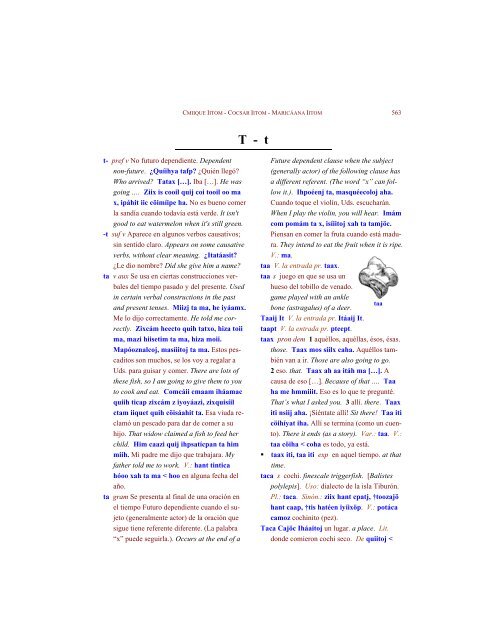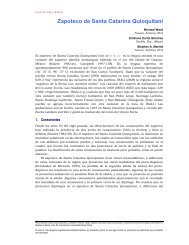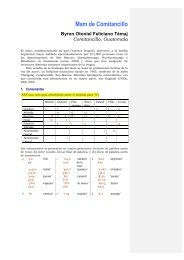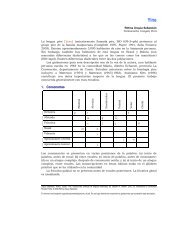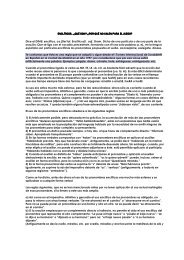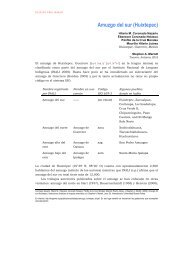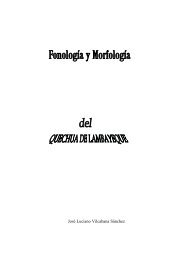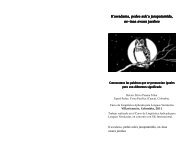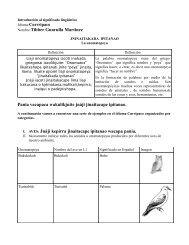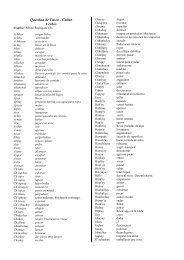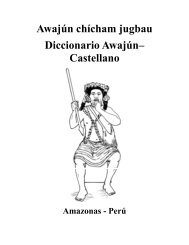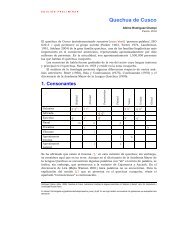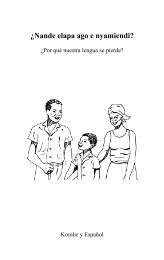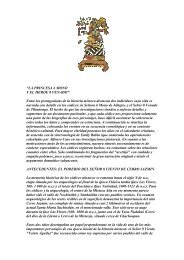- Page 1 and 2:
COMCÁAC QUIH YAZA QUIH HANT IHÍIP
- Page 3 and 4:
COMCÁAC QUIH YAZA QUIH HANT IHÍIP
- Page 5 and 6:
ÍNDICE Agradecimientos ...........
- Page 7 and 8:
durante muchos años colaboró con
- Page 9 and 10:
PRÓLOGO 11 Yolanda Lastra Institut
- Page 11 and 12:
abs (sustantivo) absolutivo adj adj
- Page 13 and 14:
EL SERI ENTRE LAS LENGUAS DEL MUNDO
- Page 15:
Mapa 2: Algunos campamentos y puebl
- Page 18 and 19:
20 hitáaca mi quijada hitáacatj n
- Page 20 and 21:
22 A veces la subentrada de un sust
- Page 22 and 23:
24 LAS POSPOSICIONES Hay un grupo p
- Page 24 and 25:
26 haat s torote, matacora, sangren
- Page 26 and 27:
28 Referencia a otra palabra. Cuand
- Page 28 and 29:
30 CMIIQUE IITOM - COCSAR IITOM - M
- Page 30 and 31:
32 CMIIQUE IITOM - COCSAR IITOM - M
- Page 32 and 33:
34 CMIIQUE IITOM - COCSAR IITOM - M
- Page 34 and 35:
36 CMIIQUE IITOM - COCSAR IITOM - M
- Page 36 and 37:
38 CMIIQUE IITOM - COCSAR IITOM - M
- Page 38 and 39:
40 CMIIQUE IITOM - COCSAR IITOM - M
- Page 40 and 41:
42 CMIIQUE IITOM - COCSAR IITOM - M
- Page 42 and 43:
44 CMIIQUE IITOM - COCSAR IITOM - M
- Page 44 and 45:
46 CMIIQUE IITOM - COCSAR IITOM - M
- Page 46 and 47:
48 CMIIQUE IITOM - COCSAR IITOM - M
- Page 48 and 49:
50 CMIIQUE IITOM - COCSAR IITOM - M
- Page 50 and 51:
52 CMIIQUE IITOM - COCSAR IITOM - M
- Page 52 and 53:
54 CMIIQUE IITOM - COCSAR IITOM - M
- Page 54 and 55:
56 CMIIQUE IITOM - COCSAR IITOM - M
- Page 56 and 57:
58 CMIIQUE IITOM - COCSAR IITOM - M
- Page 58 and 59:
60 CMIIQUE IITOM - COCSAR IITOM - M
- Page 60 and 61:
62 CMIIQUE IITOM - COCSAR IITOM - M
- Page 62 and 63:
64 CMIIQUE IITOM - COCSAR IITOM - M
- Page 64 and 65:
66 CMIIQUE IITOM - COCSAR IITOM - M
- Page 66 and 67:
68 CMIIQUE IITOM - COCSAR IITOM - M
- Page 68 and 69:
70 CMIIQUE IITOM - COCSAR IITOM - M
- Page 70 and 71:
72 CMIIQUE IITOM - COCSAR IITOM - M
- Page 72 and 73:
74 CMIIQUE IITOM - COCSAR IITOM - M
- Page 74 and 75:
76 CMIIQUE IITOM - COCSAR IITOM - M
- Page 76 and 77:
78 CMIIQUE IITOM - COCSAR IITOM - M
- Page 78 and 79:
80 CMIIQUE IITOM - COCSAR IITOM - M
- Page 80 and 81:
82 CMIIQUE IITOM - COCSAR IITOM - M
- Page 82 and 83:
84 CMIIQUE IITOM - COCSAR IITOM - M
- Page 84 and 85:
86 CMIIQUE IITOM - COCSAR IITOM - M
- Page 86 and 87:
88 CMIIQUE IITOM - COCSAR IITOM - M
- Page 88 and 89:
90 CMIIQUE IITOM - COCSAR IITOM - M
- Page 90 and 91:
92 CMIIQUE IITOM - COCSAR IITOM - M
- Page 92 and 93:
94 CMIIQUE IITOM - COCSAR IITOM - M
- Page 94 and 95:
96 CMIIQUE IITOM - COCSAR IITOM - M
- Page 96 and 97:
98 CMIIQUE IITOM - COCSAR IITOM - M
- Page 98 and 99:
100 CMIIQUE IITOM - COCSAR IITOM -
- Page 100 and 101:
102 CMIIQUE IITOM - COCSAR IITOM -
- Page 102 and 103:
104 CMIIQUE IITOM - COCSAR IITOM -
- Page 104 and 105:
106 CMIIQUE IITOM - COCSAR IITOM -
- Page 106 and 107:
108 CMIIQUE IITOM - COCSAR IITOM -
- Page 108 and 109:
110 CMIIQUE IITOM - COCSAR IITOM -
- Page 110 and 111:
112 CMIIQUE IITOM - COCSAR IITOM -
- Page 112 and 113:
114 CMIIQUE IITOM - COCSAR IITOM -
- Page 114 and 115:
116 CMIIQUE IITOM - COCSAR IITOM -
- Page 116 and 117:
118 CMIIQUE IITOM - COCSAR IITOM -
- Page 118 and 119:
120 CMIIQUE IITOM - COCSAR IITOM -
- Page 120 and 121:
122 CMIIQUE IITOM - COCSAR IITOM -
- Page 122 and 123:
124 CMIIQUE IITOM - COCSAR IITOM -
- Page 124 and 125:
126 CMIIQUE IITOM - COCSAR IITOM -
- Page 126 and 127:
128 CMIIQUE IITOM - COCSAR IITOM -
- Page 128 and 129:
130 CMIIQUE IITOM - COCSAR IITOM -
- Page 130 and 131:
132 CMIIQUE IITOM - COCSAR IITOM -
- Page 132 and 133:
134 CMIIQUE IITOM - COCSAR IITOM -
- Page 134 and 135:
136 CMIIQUE IITOM - COCSAR IITOM -
- Page 136 and 137:
138 CMIIQUE IITOM - COCSAR IITOM -
- Page 138 and 139:
140 CMIIQUE IITOM - COCSAR IITOM -
- Page 140 and 141:
142 CMIIQUE IITOM - COCSAR IITOM -
- Page 142 and 143:
144 CMIIQUE IITOM - COCSAR IITOM -
- Page 144 and 145:
146 CMIIQUE IITOM - COCSAR IITOM -
- Page 146 and 147:
148 CMIIQUE IITOM - COCSAR IITOM -
- Page 148 and 149:
150 CMIIQUE IITOM - COCSAR IITOM -
- Page 150 and 151:
152 CMIIQUE IITOM - COCSAR IITOM -
- Page 152 and 153:
154 CMIIQUE IITOM - COCSAR IITOM -
- Page 154 and 155:
156 CMIIQUE IITOM - COCSAR IITOM -
- Page 156 and 157:
158 CMIIQUE IITOM - COCSAR IITOM -
- Page 158 and 159:
160 CMIIQUE IITOM - COCSAR IITOM -
- Page 160 and 161:
162 CMIIQUE IITOM - COCSAR IITOM -
- Page 162 and 163:
164 CMIIQUE IITOM - COCSAR IITOM -
- Page 164 and 165:
166 CMIIQUE IITOM - COCSAR IITOM -
- Page 166 and 167:
168 CMIIQUE IITOM - COCSAR IITOM -
- Page 168 and 169:
170 CMIIQUE IITOM - COCSAR IITOM -
- Page 170 and 171:
172 CMIIQUE IITOM - COCSAR IITOM -
- Page 172 and 173:
174 CMIIQUE IITOM - COCSAR IITOM -
- Page 174 and 175:
176 CMIIQUE IITOM - COCSAR IITOM -
- Page 176 and 177:
178 CMIIQUE IITOM - COCSAR IITOM -
- Page 178 and 179:
180 CMIIQUE IITOM - COCSAR IITOM -
- Page 180 and 181:
182 CMIIQUE IITOM - COCSAR IITOM -
- Page 182 and 183:
184 CMIIQUE IITOM - COCSAR IITOM -
- Page 184 and 185:
186 CMIIQUE IITOM - COCSAR IITOM -
- Page 186 and 187:
188 CMIIQUE IITOM - COCSAR IITOM -
- Page 188 and 189:
190 CMIIQUE IITOM - COCSAR IITOM -
- Page 190 and 191:
192 CMIIQUE IITOM - COCSAR IITOM -
- Page 192 and 193:
194 CMIIQUE IITOM - COCSAR IITOM -
- Page 194 and 195:
196 CMIIQUE IITOM - COCSAR IITOM -
- Page 196 and 197:
198 CMIIQUE IITOM - COCSAR IITOM -
- Page 198 and 199:
200 CMIIQUE IITOM - COCSAR IITOM -
- Page 200 and 201:
202 CMIIQUE IITOM - COCSAR IITOM -
- Page 202 and 203:
204 CMIIQUE IITOM - COCSAR IITOM -
- Page 204 and 205:
206 CMIIQUE IITOM - COCSAR IITOM -
- Page 206 and 207:
208 CMIIQUE IITOM - COCSAR IITOM -
- Page 208 and 209:
210 CMIIQUE IITOM - COCSAR IITOM -
- Page 210 and 211:
212 CMIIQUE IITOM - COCSAR IITOM -
- Page 212 and 213:
214 CMIIQUE IITOM - COCSAR IITOM -
- Page 214 and 215:
216 CMIIQUE IITOM - COCSAR IITOM -
- Page 216 and 217:
218 CMIIQUE IITOM - COCSAR IITOM -
- Page 218 and 219:
220 CMIIQUE IITOM - COCSAR IITOM -
- Page 220 and 221:
222 CMIIQUE IITOM - COCSAR IITOM -
- Page 222 and 223:
224 CMIIQUE IITOM - COCSAR IITOM -
- Page 224 and 225:
226 CMIIQUE IITOM - COCSAR IITOM -
- Page 226 and 227:
228 CMIIQUE IITOM - COCSAR IITOM -
- Page 228 and 229:
230 CMIIQUE IITOM - COCSAR IITOM -
- Page 230 and 231:
232 CMIIQUE IITOM - COCSAR IITOM -
- Page 232 and 233:
234 CMIIQUE IITOM - COCSAR IITOM -
- Page 234 and 235:
236 CMIIQUE IITOM - COCSAR IITOM -
- Page 236 and 237:
238 CMIIQUE IITOM - COCSAR IITOM -
- Page 238 and 239:
240 CMIIQUE IITOM - COCSAR IITOM -
- Page 240 and 241:
242 CMIIQUE IITOM - COCSAR IITOM -
- Page 242 and 243:
244 CMIIQUE IITOM - COCSAR IITOM -
- Page 244 and 245:
246 CMIIQUE IITOM - COCSAR IITOM -
- Page 246 and 247:
248 CMIIQUE IITOM - COCSAR IITOM -
- Page 248 and 249:
250 CMIIQUE IITOM - COCSAR IITOM -
- Page 250 and 251:
252 CMIIQUE IITOM - COCSAR IITOM -
- Page 252 and 253:
254 CMIIQUE IITOM - COCSAR IITOM -
- Page 254 and 255:
256 CMIIQUE IITOM - COCSAR IITOM -
- Page 256 and 257:
258 CMIIQUE IITOM - COCSAR IITOM -
- Page 258 and 259:
260 CMIIQUE IITOM - COCSAR IITOM -
- Page 260 and 261:
262 CMIIQUE IITOM - COCSAR IITOM -
- Page 262 and 263:
264 CMIIQUE IITOM - COCSAR IITOM -
- Page 264 and 265:
266 CMIIQUE IITOM - COCSAR IITOM -
- Page 266 and 267:
268 CMIIQUE IITOM - COCSAR IITOM -
- Page 268 and 269:
270 CMIIQUE IITOM - COCSAR IITOM -
- Page 270 and 271:
272 CMIIQUE IITOM - COCSAR IITOM -
- Page 272 and 273:
274 CMIIQUE IITOM - COCSAR IITOM -
- Page 274 and 275:
276 CMIIQUE IITOM - COCSAR IITOM -
- Page 276 and 277:
278 CMIIQUE IITOM - COCSAR IITOM -
- Page 278 and 279:
280 CMIIQUE IITOM - COCSAR IITOM -
- Page 280 and 281:
282 CMIIQUE IITOM - COCSAR IITOM -
- Page 282 and 283:
284 CMIIQUE IITOM - COCSAR IITOM -
- Page 284 and 285:
286 CMIIQUE IITOM - COCSAR IITOM -
- Page 286 and 287:
288 CMIIQUE IITOM - COCSAR IITOM -
- Page 288 and 289:
290 CMIIQUE IITOM - COCSAR IITOM -
- Page 290 and 291:
292 CMIIQUE IITOM - COCSAR IITOM -
- Page 292 and 293:
294 CMIIQUE IITOM - COCSAR IITOM -
- Page 294 and 295:
296 CMIIQUE IITOM - COCSAR IITOM -
- Page 296 and 297:
298 CMIIQUE IITOM - COCSAR IITOM -
- Page 298 and 299:
300 CMIIQUE IITOM - COCSAR IITOM -
- Page 300 and 301:
302 CMIIQUE IITOM - COCSAR IITOM -
- Page 302 and 303:
304 CMIIQUE IITOM - COCSAR IITOM -
- Page 304 and 305:
306 CMIIQUE IITOM - COCSAR IITOM -
- Page 306 and 307:
308 CMIIQUE IITOM - COCSAR IITOM -
- Page 308 and 309:
310 CMIIQUE IITOM - COCSAR IITOM -
- Page 310 and 311:
312 CMIIQUE IITOM - COCSAR IITOM -
- Page 312 and 313:
314 CMIIQUE IITOM - COCSAR IITOM -
- Page 314 and 315:
316 CMIIQUE IITOM - COCSAR IITOM -
- Page 316 and 317:
318 CMIIQUE IITOM - COCSAR IITOM -
- Page 318 and 319:
320 CMIIQUE IITOM - COCSAR IITOM -
- Page 320 and 321:
322 CMIIQUE IITOM - COCSAR IITOM -
- Page 322 and 323:
324 CMIIQUE IITOM - COCSAR IITOM -
- Page 324 and 325:
326 CMIIQUE IITOM - COCSAR IITOM -
- Page 326 and 327:
328 CMIIQUE IITOM - COCSAR IITOM -
- Page 328 and 329:
330 CMIIQUE IITOM - COCSAR IITOM -
- Page 330 and 331:
332 CMIIQUE IITOM - COCSAR IITOM -
- Page 332 and 333:
334 CMIIQUE IITOM - COCSAR IITOM -
- Page 334 and 335:
336 CMIIQUE IITOM - COCSAR IITOM -
- Page 336 and 337:
338 CMIIQUE IITOM - COCSAR IITOM -
- Page 338 and 339:
340 CMIIQUE IITOM - COCSAR IITOM -
- Page 340 and 341:
342 CMIIQUE IITOM - COCSAR IITOM -
- Page 342 and 343:
344 CMIIQUE IITOM - COCSAR IITOM -
- Page 344 and 345:
346 CMIIQUE IITOM - COCSAR IITOM -
- Page 346 and 347:
348 CMIIQUE IITOM - COCSAR IITOM -
- Page 348 and 349:
350 CMIIQUE IITOM - COCSAR IITOM -
- Page 350 and 351:
352 CMIIQUE IITOM - COCSAR IITOM -
- Page 352 and 353:
354 CMIIQUE IITOM - COCSAR IITOM -
- Page 354 and 355:
356 CMIIQUE IITOM - COCSAR IITOM -
- Page 356 and 357:
358 CMIIQUE IITOM - COCSAR IITOM -
- Page 358 and 359:
360 CMIIQUE IITOM - COCSAR IITOM -
- Page 360 and 361:
362 CMIIQUE IITOM - COCSAR IITOM -
- Page 362 and 363:
364 CMIIQUE IITOM - COCSAR IITOM -
- Page 364 and 365:
366 CMIIQUE IITOM - COCSAR IITOM -
- Page 366 and 367:
368 CMIIQUE IITOM - COCSAR IITOM -
- Page 368 and 369:
370 CMIIQUE IITOM - COCSAR IITOM -
- Page 370 and 371:
372 CMIIQUE IITOM - COCSAR IITOM -
- Page 372 and 373:
374 CMIIQUE IITOM - COCSAR IITOM -
- Page 374 and 375:
376 CMIIQUE IITOM - COCSAR IITOM -
- Page 376 and 377:
378 CMIIQUE IITOM - COCSAR IITOM -
- Page 378 and 379:
380 CMIIQUE IITOM - COCSAR IITOM -
- Page 380 and 381:
382 CMIIQUE IITOM - COCSAR IITOM -
- Page 382 and 383:
384 CMIIQUE IITOM - COCSAR IITOM -
- Page 384 and 385:
386 CMIIQUE IITOM - COCSAR IITOM -
- Page 386 and 387:
388 CMIIQUE IITOM - COCSAR IITOM -
- Page 388 and 389:
390 CMIIQUE IITOM - COCSAR IITOM -
- Page 390 and 391:
392 CMIIQUE IITOM - COCSAR IITOM -
- Page 392 and 393:
394 CMIIQUE IITOM - COCSAR IITOM -
- Page 394 and 395:
396 CMIIQUE IITOM - COCSAR IITOM -
- Page 396 and 397:
398 CMIIQUE IITOM - COCSAR IITOM -
- Page 398 and 399:
400 CMIIQUE IITOM - COCSAR IITOM -
- Page 400 and 401:
402 CMIIQUE IITOM - COCSAR IITOM -
- Page 402 and 403:
404 CMIIQUE IITOM - COCSAR IITOM -
- Page 404 and 405:
406 CMIIQUE IITOM - COCSAR IITOM -
- Page 406 and 407:
408 CMIIQUE IITOM - COCSAR IITOM -
- Page 408 and 409:
410 CMIIQUE IITOM - COCSAR IITOM -
- Page 410 and 411:
412 CMIIQUE IITOM - COCSAR IITOM -
- Page 412 and 413:
414 CMIIQUE IITOM - COCSAR IITOM -
- Page 414 and 415:
416 CMIIQUE IITOM - COCSAR IITOM -
- Page 416 and 417:
418 CMIIQUE IITOM - COCSAR IITOM -
- Page 418 and 419:
420 CMIIQUE IITOM - COCSAR IITOM -
- Page 420 and 421:
422 CMIIQUE IITOM - COCSAR IITOM -
- Page 422 and 423:
424 CMIIQUE IITOM - COCSAR IITOM -
- Page 424 and 425:
426 CMIIQUE IITOM - COCSAR IITOM -
- Page 426 and 427:
428 CMIIQUE IITOM - COCSAR IITOM -
- Page 428 and 429:
430 CMIIQUE IITOM - COCSAR IITOM -
- Page 430 and 431:
432 CMIIQUE IITOM - COCSAR IITOM -
- Page 432 and 433:
434 CMIIQUE IITOM - COCSAR IITOM -
- Page 434 and 435:
436 CMIIQUE IITOM - COCSAR IITOM -
- Page 436 and 437:
438 CMIIQUE IITOM - COCSAR IITOM -
- Page 438 and 439:
440 CMIIQUE IITOM - COCSAR IITOM -
- Page 440 and 441:
442 CMIIQUE IITOM - COCSAR IITOM -
- Page 442 and 443:
444 CMIIQUE IITOM - COCSAR IITOM -
- Page 444 and 445:
446 CMIIQUE IITOM - COCSAR IITOM -
- Page 446 and 447:
448 CMIIQUE IITOM - COCSAR IITOM -
- Page 448 and 449:
450 CMIIQUE IITOM - COCSAR IITOM -
- Page 450 and 451:
452 CMIIQUE IITOM - COCSAR IITOM -
- Page 452 and 453:
454 CMIIQUE IITOM - COCSAR IITOM -
- Page 454 and 455:
456 CMIIQUE IITOM - COCSAR IITOM -
- Page 456 and 457:
458 CMIIQUE IITOM - COCSAR IITOM -
- Page 458 and 459:
460 CMIIQUE IITOM - COCSAR IITOM -
- Page 460 and 461:
462 CMIIQUE IITOM - COCSAR IITOM -
- Page 462 and 463:
464 CMIIQUE IITOM - COCSAR IITOM -
- Page 464 and 465:
466 CMIIQUE IITOM - COCSAR IITOM -
- Page 466 and 467:
468 CMIIQUE IITOM - COCSAR IITOM -
- Page 468 and 469:
470 CMIIQUE IITOM - COCSAR IITOM -
- Page 470 and 471:
472 CMIIQUE IITOM - COCSAR IITOM -
- Page 472 and 473:
474 CMIIQUE IITOM - COCSAR IITOM -
- Page 474 and 475:
476 CMIIQUE IITOM - COCSAR IITOM -
- Page 476 and 477:
478 CMIIQUE IITOM - COCSAR IITOM -
- Page 478 and 479:
480 CMIIQUE IITOM - COCSAR IITOM -
- Page 480 and 481:
482 CMIIQUE IITOM - COCSAR IITOM -
- Page 482 and 483:
484 CMIIQUE IITOM - COCSAR IITOM -
- Page 484 and 485:
486 CMIIQUE IITOM - COCSAR IITOM -
- Page 486 and 487:
488 CMIIQUE IITOM - COCSAR IITOM -
- Page 488 and 489:
490 CMIIQUE IITOM - COCSAR IITOM -
- Page 490 and 491:
492 CMIIQUE IITOM - COCSAR IITOM -
- Page 492 and 493:
494 CMIIQUE IITOM - COCSAR IITOM -
- Page 494 and 495:
496 CMIIQUE IITOM - COCSAR IITOM -
- Page 496 and 497:
498 CMIIQUE IITOM - COCSAR IITOM -
- Page 498 and 499:
500 CMIIQUE IITOM - COCSAR IITOM -
- Page 500 and 501:
502 CMIIQUE IITOM - COCSAR IITOM -
- Page 502 and 503:
504 CMIIQUE IITOM - COCSAR IITOM -
- Page 504 and 505:
506 CMIIQUE IITOM - COCSAR IITOM -
- Page 506 and 507:
508 CMIIQUE IITOM - COCSAR IITOM -
- Page 508 and 509:
510 CMIIQUE IITOM - COCSAR IITOM -
- Page 510 and 511: 512 CMIIQUE IITOM - COCSAR IITOM -
- Page 512 and 513: 514 CMIIQUE IITOM - COCSAR IITOM -
- Page 514 and 515: 516 CMIIQUE IITOM - COCSAR IITOM -
- Page 516 and 517: 518 CMIIQUE IITOM - COCSAR IITOM -
- Page 518 and 519: 520 CMIIQUE IITOM - COCSAR IITOM -
- Page 520 and 521: 522 CMIIQUE IITOM - COCSAR IITOM -
- Page 522 and 523: 524 CMIIQUE IITOM - COCSAR IITOM -
- Page 524 and 525: 526 CMIIQUE IITOM - COCSAR IITOM -
- Page 526 and 527: 528 CMIIQUE IITOM - COCSAR IITOM -
- Page 528 and 529: 530 CMIIQUE IITOM - COCSAR IITOM -
- Page 530 and 531: 532 CMIIQUE IITOM - COCSAR IITOM -
- Page 532 and 533: 534 CMIIQUE IITOM - COCSAR IITOM -
- Page 534 and 535: 536 CMIIQUE IITOM - COCSAR IITOM -
- Page 536 and 537: 538 CMIIQUE IITOM - COCSAR IITOM -
- Page 538 and 539: 540 CMIIQUE IITOM - COCSAR IITOM -
- Page 540 and 541: 542 CMIIQUE IITOM - COCSAR IITOM -
- Page 542 and 543: 544 CMIIQUE IITOM - COCSAR IITOM -
- Page 544 and 545: 546 CMIIQUE IITOM - COCSAR IITOM -
- Page 546 and 547: 548 CMIIQUE IITOM - COCSAR IITOM -
- Page 548 and 549: 550 CMIIQUE IITOM - COCSAR IITOM -
- Page 550 and 551: 552 CMIIQUE IITOM - COCSAR IITOM -
- Page 552 and 553: 554 CMIIQUE IITOM - COCSAR IITOM -
- Page 554 and 555: 556 CMIIQUE IITOM - COCSAR IITOM -
- Page 556 and 557: 558 CMIIQUE IITOM - COCSAR IITOM -
- Page 558 and 559: 560 CMIIQUE IITOM - COCSAR IITOM -
- Page 562 and 563: 564 CMIIQUE IITOM - COCSAR IITOM -
- Page 564 and 565: 566 CMIIQUE IITOM - COCSAR IITOM -
- Page 566 and 567: 568 CMIIQUE IITOM - COCSAR IITOM -
- Page 568 and 569: 570 CMIIQUE IITOM - COCSAR IITOM -
- Page 570 and 571: 572 CMIIQUE IITOM - COCSAR IITOM -
- Page 572 and 573: 574 CMIIQUE IITOM - COCSAR IITOM -
- Page 574 and 575: 576 CMIIQUE IITOM - COCSAR IITOM -
- Page 576 and 577: 578 CMIIQUE IITOM - COCSAR IITOM -
- Page 578 and 579: 580 CMIIQUE IITOM - COCSAR IITOM -
- Page 580 and 581: 582 CMIIQUE IITOM - COCSAR IITOM -
- Page 582 and 583: 584 CMIIQUE IITOM - COCSAR IITOM -
- Page 584 and 585: 586 CMIIQUE IITOM - COCSAR IITOM -
- Page 586 and 587: 588 CMIIQUE IITOM - COCSAR IITOM -
- Page 588 and 589: 590 CMIIQUE IITOM - COCSAR IITOM -
- Page 590 and 591: 592 CMIIQUE IITOM - COCSAR IITOM -
- Page 592 and 593: 594 CMIIQUE IITOM - COCSAR IITOM -
- Page 594 and 595: 596 CMIIQUE IITOM - COCSAR IITOM -
- Page 596 and 597: 598 CMIIQUE IITOM - COCSAR IITOM -
- Page 598 and 599: 600 CMIIQUE IITOM - COCSAR IITOM -
- Page 600 and 601: 602 CMIIQUE IITOM - COCSAR IITOM -
- Page 602 and 603: 604 CMIIQUE IITOM - COCSAR IITOM -
- Page 604 and 605: 606 CMIIQUE IITOM - COCSAR IITOM -
- Page 606 and 607: 608 CMIIQUE IITOM - COCSAR IITOM -
- Page 608 and 609: 610 CMIIQUE IITOM - COCSAR IITOM -
- Page 610 and 611:
612 CMIIQUE IITOM - COCSAR IITOM -
- Page 612 and 613:
614 CMIIQUE IITOM - COCSAR IITOM -
- Page 614 and 615:
616 CMIIQUE IITOM - COCSAR IITOM -
- Page 616 and 617:
618 CMIIQUE IITOM - COCSAR IITOM -
- Page 618 and 619:
620 CMIIQUE IITOM - COCSAR IITOM -
- Page 620 and 621:
622 CMIIQUE IITOM - COCSAR IITOM -
- Page 622 and 623:
624 CMIIQUE IITOM - COCSAR IITOM -
- Page 624 and 625:
626 CMIIQUE IITOM - COCSAR IITOM -
- Page 626 and 627:
628 CMIIQUE IITOM - COCSAR IITOM -
- Page 628 and 629:
630 CMIIQUE IITOM - COCSAR IITOM -
- Page 630 and 631:
632 CMIIQUE IITOM - COCSAR IITOM -
- Page 632 and 633:
634 CMIIQUE IITOM - COCSAR IITOM -
- Page 634 and 635:
636 CMIIQUE IITOM - COCSAR IITOM -
- Page 637 and 638:
a. (cosa inanimada) ano; — él,
- Page 639 and 640:
agarrar cnaaij, conáaij, queepjc,
- Page 641 and 642:
altanero isoj *cacoléelo, hiitisca
- Page 643 and 644:
apostar cö|queepit; usar para —
- Page 645 and 646:
asiento en la panga iti yaaipj. aso
- Page 647 and 648:
haaonam iháafin. bandada iti cocá
- Page 649 and 650:
azo inol, †yaapxöt, †yeepx;
- Page 651 and 652:
calabacita. una — caay ixám. cal
- Page 653 and 654:
capuchón (de lámpara de gas) ham
- Page 655 and 656:
cepillarse. (el cabello) †csaai c
- Page 657 and 658:
columpio hatxánoj. collar hapápjc
- Page 659 and 660:
corona del bailador de la ceremonia
- Page 661 and 662:
cuerda puesta en la cintura arriba
- Page 663 and 664:
“tootjöc hant ihíti” tootjöc
- Page 665 and 666:
hacx *quiquim. descuidar hax oo *qu
- Page 667 and 668:
Dos Amigos. campo — Saps. dote cm
- Page 669 and 670:
enhebrar caazj, ano *quisl; (aguja)
- Page 671 and 672:
esos, esas tacoi; (cosas blandas) t
- Page 673 and 674:
existir -paho, V.: quiho, haquix *q
- Page 675 and 676:
canóaa quih ipócj itac; ziix xepe
- Page 677 and 678:
genealogía pti iyat cöcoocp. geni
- Page 679 and 680:
haba hapats imóon. haber -paho, V.
- Page 681 and 682:
honestamente. vivir — yamtxö cö
- Page 683 and 684:
inmadura. [fruta] quicsj; [vaina de
- Page 685 and 686:
que se usan carrizos xapij hacáiit
- Page 687 and 688:
para otra persona o uso cacófmoj;
- Page 689 and 690:
campamento con noticias heme iiqui
- Page 691 and 692:
xepe *cöcacóoot; — por tierra h
- Page 693 and 694:
— isoj iiqui *quihíizat. mediofo
- Page 695 and 696:
morder. — con los dientes delante
- Page 697 and 698:
(hijo o hija del hijo de ella) acá
- Page 699 and 700:
oración Yooz ihatólec. orar Yooz
- Page 701 and 702:
papa joját hapéc. papache, papach
- Page 703 and 704:
cotópis, ctopis; hacer — por suc
- Page 705 and 706:
pick-up ziix hacx tiij catax cjip.
- Page 707 and 708:
pompanito siic imám. poner caahca;
- Page 709 and 710:
pulmón isct. pulmonía. tener —
- Page 711 and 712:
*cojöz. raspador para pieles hapn
- Page 713 and 714:
espingar [caballo] cola *quinl. res
- Page 715 and 716:
— cö|cacóoix; hacer — repenti
- Page 717 and 718:
siete *tomcoj cöquiih; (en el sist
- Page 719 and 720:
suéter an iquípilc caamiz, hasc a
- Page 721 and 722:
cö|quimjc, quixi; — de hacer cat
- Page 723 and 724:
torito. (planta anual) *xonj caacö
- Page 725 and 726:
ubre imax. ubrera. tener — itéen
- Page 727 and 728:
yaap itac; — de ballena hacméaaj
- Page 729:
zacate conée; — borreguero *con
- Page 732 and 733:
734 MARICÁANA IITOM - CMIIQUE IITO
- Page 734 and 735:
736 MARICÁANA IITOM - CMIIQUE IITO
- Page 736 and 737:
738 MARICÁANA IITOM - CMIIQUE IITO
- Page 738 and 739:
740 MARICÁANA IITOM - CMIIQUE IITO
- Page 740 and 741:
742 MARICÁANA IITOM - CMIIQUE IITO
- Page 742 and 743:
744 MARICÁANA IITOM - CMIIQUE IITO
- Page 744 and 745:
746 MARICÁANA IITOM - CMIIQUE IITO
- Page 746 and 747:
748 MARICÁANA IITOM - CMIIQUE IITO
- Page 748 and 749:
750 MARICÁANA IITOM - CMIIQUE IITO
- Page 750 and 751:
752 MARICÁANA IITOM - CMIIQUE IITO
- Page 752 and 753:
754 MARICÁANA IITOM - CMIIQUE IITO
- Page 754 and 755:
756 MARICÁANA IITOM - CMIIQUE IITO
- Page 756 and 757:
758 MARICÁANA IITOM - CMIIQUE IITO
- Page 758 and 759:
760 MARICÁANA IITOM - CMIIQUE IITO
- Page 760 and 761:
762 MARICÁANA IITOM - CMIIQUE IITO
- Page 762 and 763:
764 MARICÁANA IITOM - CMIIQUE IITO
- Page 764 and 765:
766 MARICÁANA IITOM - CMIIQUE IITO
- Page 766 and 767:
768 MARICÁANA IITOM - CMIIQUE IITO
- Page 768 and 769:
770 MARICÁANA IITOM - CMIIQUE IITO
- Page 770 and 771:
772 MARICÁANA IITOM - CMIIQUE IITO
- Page 772 and 773:
774 MARICÁANA IITOM - CMIIQUE IITO
- Page 774 and 775:
776 MARICÁANA IITOM - CMIIQUE IITO
- Page 776 and 777:
778 MARICÁANA IITOM - CMIIQUE IITO
- Page 778 and 779:
780 MARICÁANA IITOM - CMIIQUE IITO
- Page 780 and 781:
782 MARICÁANA IITOM - CMIIQUE IITO
- Page 782 and 783:
784 MARICÁANA IITOM - CMIIQUE IITO
- Page 784 and 785:
786 MARICÁANA IITOM - CMIIQUE IITO
- Page 786 and 787:
788 MARICÁANA IITOM - CMIIQUE IITO
- Page 788 and 789:
790 MARICÁANA IITOM - CMIIQUE IITO
- Page 790 and 791:
792 MARICÁANA IITOM - CMIIQUE IITO
- Page 792 and 793:
794 MARICÁANA IITOM - CMIIQUE IITO
- Page 794 and 795:
796 MARICÁANA IITOM - CMIIQUE IITO
- Page 796 and 797:
798 MARICÁANA IITOM - CMIIQUE IITO
- Page 798 and 799:
800 MARICÁANA IITOM - CMIIQUE IITO
- Page 800 and 801:
802 MARICÁANA IITOM - CMIIQUE IITO
- Page 802 and 803:
804 MARICÁANA IITOM - CMIIQUE IITO
- Page 804 and 805:
806 MARICÁANA IITOM - CMIIQUE IITO
- Page 806 and 807:
808 MARICÁANA IITOM - CMIIQUE IITO
- Page 808 and 809:
810 MARICÁANA IITOM - CMIIQUE IITO
- Page 810 and 811:
812 MARICÁANA IITOM - CMIIQUE IITO
- Page 812 and 813:
814 MARICÁANA IITOM - CMIIQUE IITO
- Page 814 and 815:
816 MARICÁANA IITOM - CMIIQUE IITO
- Page 816 and 817:
818 MARICÁANA IITOM - CMIIQUE IITO
- Page 818 and 819:
820 MARICÁANA IITOM - CMIIQUE IITO
- Page 820 and 821:
822 MARICÁANA IITOM - CMIIQUE IITO
- Page 822 and 823:
824 MARICÁANA IITOM - CMIIQUE IITO
- Page 824 and 825:
826 GRAMÁTICA SERI 1.2. Las conson
- Page 826 and 827:
828 GRAMÁTICA SERI 1.3. Acentuaci
- Page 828 and 829:
830 GRAMÁTICA SERI a. hast ihyáa
- Page 830 and 831:
832 GRAMÁTICA SERI Para usar el di
- Page 832 and 833:
834 GRAMÁTICA SERI ipac (lugar) de
- Page 834 and 835:
836 GRAMÁTICA SERI Los términos d
- Page 836 and 837:
838 GRAMÁTICA SERI ipáhit s obl p
- Page 838 and 839:
840 GRAMÁTICA SERI 2.2. Los determ
- Page 840 and 841:
842 GRAMÁTICA SERI 2.3. La posesi
- Page 842 and 843:
844 GRAMÁTICA SERI [ zixquisíil h
- Page 844 and 845:
846 GRAMÁTICA SERI 2.6.1. El prono
- Page 846 and 847:
848 GRAMÁTICA SERI Con algunos ver
- Page 848 and 849:
850 GRAMÁTICA SERI semánticos. Ad
- Page 850 and 851:
852 GRAMÁTICA SERI Se puede usar c
- Page 852 and 853:
854 GRAMÁTICA SERI 3.2.1. El verbo
- Page 854 and 855:
856 GRAMÁTICA SERI Un verbo causat
- Page 856 and 857:
858 GRAMÁTICA SERI quimáhaj v der
- Page 858 and 859:
860 GRAMÁTICA SERI Para formar est
- Page 860 and 861:
862 GRAMÁTICA SERI ihyáa, hyaa 21
- Page 862 and 863:
864 GRAMÁTICA SERI si- ¿Siitax ha
- Page 864 and 865:
866 GRAMÁTICA SERI 3.5.5. Neutro L
- Page 866 and 867:
868 GRAMÁTICA SERI Pazíim áa, ha
- Page 868 and 869:
870 GRAMÁTICA SERI Imperativo Neut
- Page 870 and 871:
872 GRAMÁTICA SERI La persona del
- Page 872 and 873:
874 GRAMÁTICA SERI Ocasionalmente
- Page 874 and 875:
876 GRAMÁTICA SERI 3.12. Oraciones
- Page 876 and 877:
878 GRAMÁTICA SERI miihax contigo
- Page 878 and 879:
880 GRAMÁTICA SERI Adverbio que si
- Page 880 and 881:
882 GRAMÁTICA SERI Hamatícpan tax
- Page 882 and 883:
884 GRAMÁTICA SERI [ Hast com ica
- Page 884 and 885:
886 GRAMÁTICA SERI Nominalización
- Page 886 and 887:
888 GRAMÁTICA SERI Sujeto Compleme
- Page 888 and 889:
890 GRAMÁTICA SERI Haquéjöc iny
- Page 890 and 891:
892 GRAMÁTICA SERI [ Icóoit ] qui
- Page 892 and 893:
894 GRAMÁTICA SERI En otros casos,
- Page 894 and 895:
896 GRAMÁTICA SERI ¿ [ Miisax iic
- Page 896 and 897:
898 GRAMÁTICA SERI Compl. de Posp.
- Page 898 and 899:
900 GRAMÁTICA SERI En los siguient
- Page 900 and 901:
902 GRAMÁTICA SERI VERBOS CUYOS TE
- Page 902 and 903:
904 GRAMÁTICA SERI VERBOS CUYOS TE
- Page 904 and 905:
906 GRAMÁTICA SERI VERBOS CUYOS TE
- Page 906 and 907:
908 GRAMÁTICA SERI VERBOS CUYOS TE
- Page 908 and 909:
910 GRAMÁTICA SERI VERBOS CUYOS TE
- Page 910 and 911:
912 GRAMÁTICA SERI Apéndice 2: Co
- Page 912 and 913:
914 GRAMÁTICA SERI moler cosa seca
- Page 914 and 915:
916 GRAMÁTICA SERI saber (sing.) s
- Page 916 and 917:
918 GRAMÁTICA SERI pobre 53 (que m
- Page 918 and 919:
920 GRAMÁTICA SERI Estos verbos se
- Page 920 and 921:
922 GRAMÁTICA SERI mandar 56 lleva
- Page 922 and 923:
GRAMÁTICA SERI 924 Apéndice 4: Pa
- Page 924 and 925:
Apéndice 5: Prefijos y sufijos a-
- Page 926 and 927:
928 GRAMÁTICA SERI hp-, ihp- Sujet
- Page 928 and 929:
930 GRAMÁTICA SERI nt- alejándose
- Page 930 and 931:
Apéndice 6: Algunos términos de p
- Page 932 and 933:
Referencias bibliográficas GRAMÁT
- Page 934 and 935:
936 GRAMÁTICA SERI ———— y
- Page 936 and 937:
938 GRAMÁTICA SERI 3.2.5. El verbo
- Page 938 and 939:
940 GRAMÁTICA SERI NOTAS TÉCNICAS
- Page 940 and 941:
942 GRAMÁTICA SERI o (p. 845) Más


